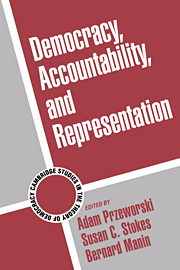Book contents
- Frontmatter
- Contents
- List of Contributors
- Introduction
- Part One Elections, Accountability, and Representation
- Part Two The Structure of Government and Accountability
- 8 Accountability in Athenian Politics
- 9 Government Accountability in Parliamentary Democracy
- 10 Mixing Elected and Nonelected Officials in Democratic Policy Making: Fundamentals of Accountability and Responsibility
- Part Three Overview
- Author Index
- Subject Index
9 - Government Accountability in Parliamentary Democracy
Published online by Cambridge University Press: 05 June 2012
- Frontmatter
- Contents
- List of Contributors
- Introduction
- Part One Elections, Accountability, and Representation
- Part Two The Structure of Government and Accountability
- 8 Accountability in Athenian Politics
- 9 Government Accountability in Parliamentary Democracy
- 10 Mixing Elected and Nonelected Officials in Democratic Policy Making: Fundamentals of Accountability and Responsibility
- Part Three Overview
- Author Index
- Subject Index
Summary
The chapters in this volume are devoted to the subject of democratic accountability. Most of these contributions focus on the relationship between the performance of institutional agents and the preferences of political principals from the broader polity – citizens, the electorate, or actual voters. This relationship is said to reflect accountability if there are instruments available to political principals enabling them to discern and sanction the behavior of institutional agents. In most of the world's democracies, however, institutional agents are (at best) only indirectly accountable to these political principals. Most of the world's democracies, that is, are parliamentary, and the essence of parliamentary democracy is the accountability of the government (also called cabinet, executive, or administration) to the legislature. Of course, the legislature is exposed to the discipline of the electoral system, and so there may well be a multilinked chain of accountability between government and electorate. Although citizens in parliamentary democracies have no recourse to sanctioning a government directly, they can change the composition of parliament, which, in turn, may force changes in the composition of the cabinet. Whether this broader form of accountability obtains or not, it is still of interest to examine the narrower issue of government accountability to parliament, and, in fact, the latter is necessary for any broader accountability. The purpose of the chapter, as its title indicates, is to concentrate on this arrangement of institutional accountability.
The accountability of the government to parliament is not merely a normative desideratum of parliamentary democracy.
- Type
- Chapter
- Information
- Democracy, Accountability, and Representation , pp. 279 - 296Publisher: Cambridge University PressPrint publication year: 1999
- 18
- Cited by

